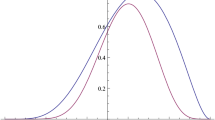Abstract
This paper discusses α-admissiblility and d-admissiblity which are important concepts in studying the performance of statistical tests for composite hypotheses. A sufficient condition for α-admissibility is presented. When α=1/m, the Nomakuchi-Sakata test, which is uniformly more powerful than the likelihood ratio test for hypotheses min (θ1, θ1) = 0 versus min (θ1, θ1) > 0, is generalized for a class of distributions in an exponential family, and its unbiasedness and α-admissibility are shown. Finally, the case of α≠ 1/m is discussed in brief.
Similar content being viewed by others
References
Birnbaum, A. (1955). Characterization of complete classes of tests of some multiparameter hypotheses, with applications to likelihood ratio tests, Ann. Math. Statist., 26, 21–36.
Berger, R. L. (1989). Uniformly more powerful tests for hypotheses concerning linear inequalities and normal means, J. Amer. Statist. Assoc., 89, 192–199.
Cohen, A., Gatsonis, C. and Marden, J. I. (1983). Hypothsis tests and optimality properties in discrete multivariate analysis, Studies in Econometrics, Time Series and Multivariate Statistics (eds. S.Karlin, T.Amemiya and L. A.Goodman), 379–405, Academic Press, New York.
Gutmann, S. (1987). Tests uniformly more powerful than uniformly most powerful monotone tests, J. Statist. Plann. Inference. 17, 279–292.
Inada, K. (1978). Some bivariate tests of composite hypothesis with restricted alternative, Rep. Fac. Sci. Kagoshima Univ. Math. Phys. Chem., 11, 25–31.
Karlin, S. (1968). Total Positivity, Vol. 1, Stanford University, California.
Lehmann, E. L. (1952). Testing multiparameter hypotheses, Ann. Math. Statist., 23, 541–552.
Lehmann, E. L. (1986). Testing Statistical Hypothesea, 2nd ed., Wiley, New York.
Nomakuchi, K. and Sakata, T. (1987). A note on testing two-dimensional normal mean, Ann. Inst. Statist. Math., 39, 489–495.
Sasabuchi, S. (1980). A test of a multivariate normal mean with composite hypotheses determined by linear inequality, Biometrika, 67, 429–439.
Sasabuchi, S. (1988a). A multivariate test with composite hypotheses determined by linear inequalities when the covariance matrix has an unknown scale factor, Mem. Fac. Sci. Kyushu Univ. Ser. A., 42, 9–19.
Sasabuchi, S. (1988b). A multivariate one-sided test with composite hypotheses when the covariance matrix is completely unknown, Mem. Fac. Sci. Kyushu Univ. Ser. A, 42, 37–46.
Stein, C. (1956). The admissibility of Hotelling's T 2-test, Ann. Math. Statist., 27, 616–623.
Author information
Authors and Affiliations
About this article
Cite this article
Iwasa, M. Admissibility of unbiased tests for a composite hypothesis with a restricted alternative. Ann Inst Stat Math 43, 657–665 (1991). https://doi.org/10.1007/BF00121645
Received:
Revised:
Issue Date:
DOI: https://doi.org/10.1007/BF00121645



